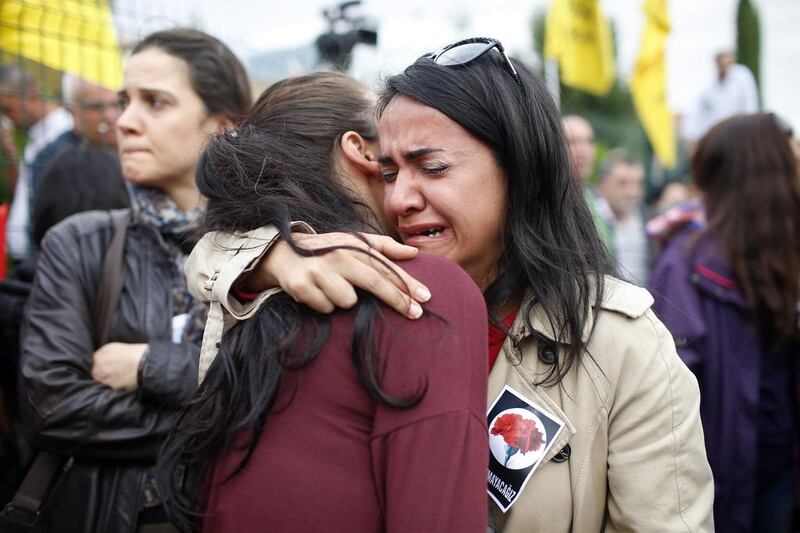The deadly suicide bombings in Ankara have heightened fears that Turkey’s troubled Syria policy may be experiencing blowback.
The twin attacks – Turkey’s most devastating in recent history – killed at least 97 civilians and wounded 246 more on Saturday during a predominantly Kurdish peace rally in the capital.
ISIL is the prime suspect in the suicide bombings, and investigators are close to identifying one of the perpetrators, prime minister Ahmet Davutoglu told Turkish broadcaster NTV on Monday.
Turkish president Recep Tayyip Erdogan has dangerously supported hardline militant groups – such as the Army of Conquest, a coalition that includes Al Qaeda’s Syria branch Jabhat Al Nusra and the Salafist group Ahrar Al Sham – to topple Syrian president Bashar Al Assad.
His contentious policy in Syria was already under strain before this, with Russia directly intervening in the war and the US forging close ties with Turkey’s other nemesis on the ground – the Kurdish Democratic Union Party (PYD).
The growing tussle of superpowers in the Syrian war is edging Turkey out of the equation, according to analysts.
“Turkey, in my judgement, is no longer a first rank player in the Syrian crisis. It will always have a role to play, but only because of its geography,” said Soli Ozel, professor of international relations at Kadir Has University in Istanbul.
Russia’s intervention has altered the course of war, not least for Turkey. One immediate effect will be the likely inclusion of Mr Al Assad in any transitional deal, a bitter pill Turkish leaders will have to swallow.
“Turkey will probably be part of any negotiating table, but I doubt that it will have much of a say as to who sits at the table,” Mr Ozel said.
Mr Erdogan will officially maintain his stance on ousting Mr Al Assad so as not to appear to have backed down from his position, but this may change should, as expected, Mr Erdogan’s AKP fail to win a majority in the upcoming elections, according to veteran Turkish journalist Semih Idiz.
“Turkey’s current policy [on Assad] is unsustainable and could change after the elections on November 1,” he said.
The shift appears even more likely, Mr Idiz added, given the West’s gradual gravitation towards accepting Mr Al Assad in any interim peace deal.
Turkey first emerged as a major player in the Syrian conflict when anti-regime protests began in 2011, pursuing a vigorous policy of backing mostly religiously conservative rebels to overthrow the Assad regime and empower the Muslim Brotherhood. But Ankara’s objectives are slowly blunting as the war draws in direct interventions from the US and Russia.
The priorities of the major powers have taken precedence, with Washington’s main focus on eradicating ISIL and Moscow determined to protect its key ally Mr Al Assad and prevent the Syrian state from crumbling further.
Another indicator of the zero-sum effect Russia’s intervention has had on Turkey’s influence in Syria is the question of Mr Erdogan’s proposed safe-zone within northern Syria.
“The Russian intervention has put the last nail into the coffin for Ankara in terms of its demand for a safe zone,” Mr Idiz said.
Russia’s violations of Turkish airspace last week demonstrate Moscow’s hostility towards a no-fly zone, and send a message to Turkey to respect Syria’s sovereignty, according to Mr Idiz.
Russian incursions into Turkey’s airspace and their close aerial encounters are also a power play that exposes Ankara’s inability to stop the Russians.
“[Russia is] showing its power and exposing Erdogan’s helplessness,” Mr Ozel said.
Pushed back by Russia and facing ISIL’s terror, Turkey is also being squeezed by its main ally, the US.
Washington’s war on ISIL has brought the Americans closer to the PYD, the only acceptable ground force that has proven capable of defeating ISIL extremists.
“Turkey is clearly displeased with the rising international profile of the PYD, which it is insisting is a terrorist organisation like the PKK, but appears to have little it can do to prevent this,” Mr Idiz said.
A key Turkish interest is to prevent the emergence of an independent Kurdish state in northeastern Syria, fearing it would inspire further unrest among its large Kurdish minority.
While a Kurdish state is unlikely, the importance of the PYD to Washington in its fight against ISIL has curtailed Ankara’s ability to weaken the group.
“The fact that the PYD, which is getting support from the US led-coalition against ISIL, is establishing warm ties with Moscow, is set to weaken Turkey’s hand even more against this group,” Mr Idiz said.
Mr Erdogan’s Syria policy was designed to expand Turkish influence in its southern neighbour.
Instead, he may be relegated to spectator status as he watches three worst case scenarios unfold: Mr Al Assad retaining interim power; the Kurds obtaining unprecedented power along the Turkey-Syria border; and radical ISIL with no qualms spreading its terror into the heart of Turkey.
foreign.desk@thenational.ae





